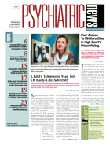They say two heads are better than one, but antidepressant medications do not appear to follow the same rule.
Researchers at the University of Texas Southwestern Medical Center in Dallas recently asked themselves "Could remission rates from depression be increased with a combination of two antidepressant medications used together as initial treatment," citing the fact that other branches of medicine often employ combination treatments at the outset of chronic illness (cardiovascular diseases, for example) especially for the more severely ill.
That question initiated the Combining Medications to Enhance Depression Outcomes (CO-MED) trial, a seven-month, single-blind, randomized, placebo-controlled trial designed as a proof-of-concept study to determine whether either of two different antidepressant combinations would produce a higher remission rate at 12 weeks and, secondarily after seven months, than monotherapy with a selective serotonin reuptake inhibitor (SSRI) as a first-step treatment in outpatients with chronic or recurrent major depression.
The researchers also compared the treatment effects on patient retention, side-effect burden, and quality of life.
The study group included 660 outpatients with nonpsychotic major depression from six primary and nine psychiatric care sites. Enrollees were aged 18 to 75 and met DSM-IV-TR criteria for either recurrent or chronic (current episode lasting at least two years) major depression according to a clinical interview, confirmed with a DSM-IV-based symptom checklist completed by the clinical research coordinator.
Participants were randomly assigned to treatment with escitalopram plus placebo (monotherapy), bupropion plus escitalopram, or venlafaxine plus mirtazapine. Outcome measures were assessed at baseline and all treatment visits. The primary outcome, symptom remission, was based on the score on the 16-item Quick Inventory of Depressive Symptomatology Self-Report at 12 weeks.
The researchers, who published their results online May 2 in AJP in Advance, found that remission and response rates were not different either at 12 weeks or seven months and that the effects of the three treatments on quality of life and on work and social adjustment were not different. "The remission rates approximated those expected on the basis of monotherapy studies of chronic depression," they wrote. Even more discouraging, they found that both combination treatments had more side effects (in terms of frequence, intensity, or burden) than monotherapy, in both the acute and continuation phases. In particular, the venlafaxine-plus-mirtazapine participants experienced the greater side-effect frequency and intensity at 12 weeks and seven months of all three treatment groups.
"Clinicians should not rush to prescribe combinations of antidepressant medications as first-line treatment for patients with major depressive disorder," said Madhukar Trivedi, M.D., a professor of psychiatry and chief of the Division of Mood Disorders at UT Southwestern and principal investigator of the study. "The clinical implications are very clear: The extra cost and burden of two medications is not worthwhile as a first treatment step."
One of the study's limitations, said the researchers, is that—while larger than many studies—the study group may not have been representative of the universe of outpatients with chronic or recurrent major depression.
The study was funded by a National Institute of Mental Health grant to the University of Texas Southwestern Medical Center for principal investigators Rush and Trivedi. Forest Pharmaceuticals, GlaxoSmithKline, Organon, and Wyeth Pharmaceuticals provided medications for the trial at no cost.
